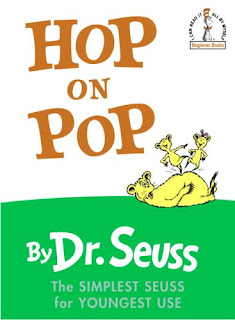Monday, September 13, 2010
Adventures with Hop on Pop, or, how I became a reader
I've loved words for as long as I can remember, and since, as a preschooler, I sang the ABCs song 47 times before 10 a.m. every day, my mother decided it was time for me to stop chewing on the refrigerator's magnetic alphabet letters and learn to do something useful with them. My parents taught me to read shortly thereafter via the Dr. Seuss book, Hop on Pop (which accounts for Timbuktu and Constantinople still being two of my favorite words). I quickly became one of those kids who brought books along on play dates, just in case playing with the friend got boring.
Reading for me was a kind of game. As a child, I liked to puzzle my way through the meaning the letters and words made together. I worked my way through the ranks of books my teachers gave me, from Dr. Seuss to the Boxcar Children to Newbery Award winners. Finally, my teachers pushed me on to more erudite echelons and began giving me classics, which provided even more meat for my baby reading teeth to chew on. I liked them--reading dense Dickens and Dumas was like heavy lifting for my adolescent mind, and though sometimes painful, I generally enjoyed the workout. I always followed these workouts with several rounds of literary Gatorade, in the form of retold fairy tales and fantasy stories, YA adventure lit, or Harry Potter.
As an English major now, I've had to reread many of these books I read as a young girl, classics or no, and I've found that there is always much, much more to the story than I ever understood back then. The older I get, the more I learn that following the plot or even understanding the author's intentions with a text, is only scratching the surface of real reading. Now, my English major brain tells me to look for evidence of creative wordsmithing, literary theory, cultural insights, and my own personal application in the literature I read. As a reader now, I care less about adventurous plots or tough mental gymnastics, and more about the thematic and creative genius that lies at the heart of great literature. And since for so many years I read for the thrilling rush of it, learning to slow down and see those things my English major brain is looking for is an entirely different kind of reading--one that I'm still learning how to do. I don't always know how to quantify the meaning that I know is there or how to interpret my own responses. Reading now evokes a more cautious kind of glee within me, because I feel much more wary of my abilities to read and understand every secret passageway through these literary mazes. But I guess that's why I keep reading. The more I read, the less I know, and the more I want to. The more I read, the more I learn about myself and my world.
With my first book I went to Constantinople and Timbuktu. Now I read to learn what other miracles that these books can do.
Subscribe to:
Post Comments (Atom)


No comments:
Post a Comment